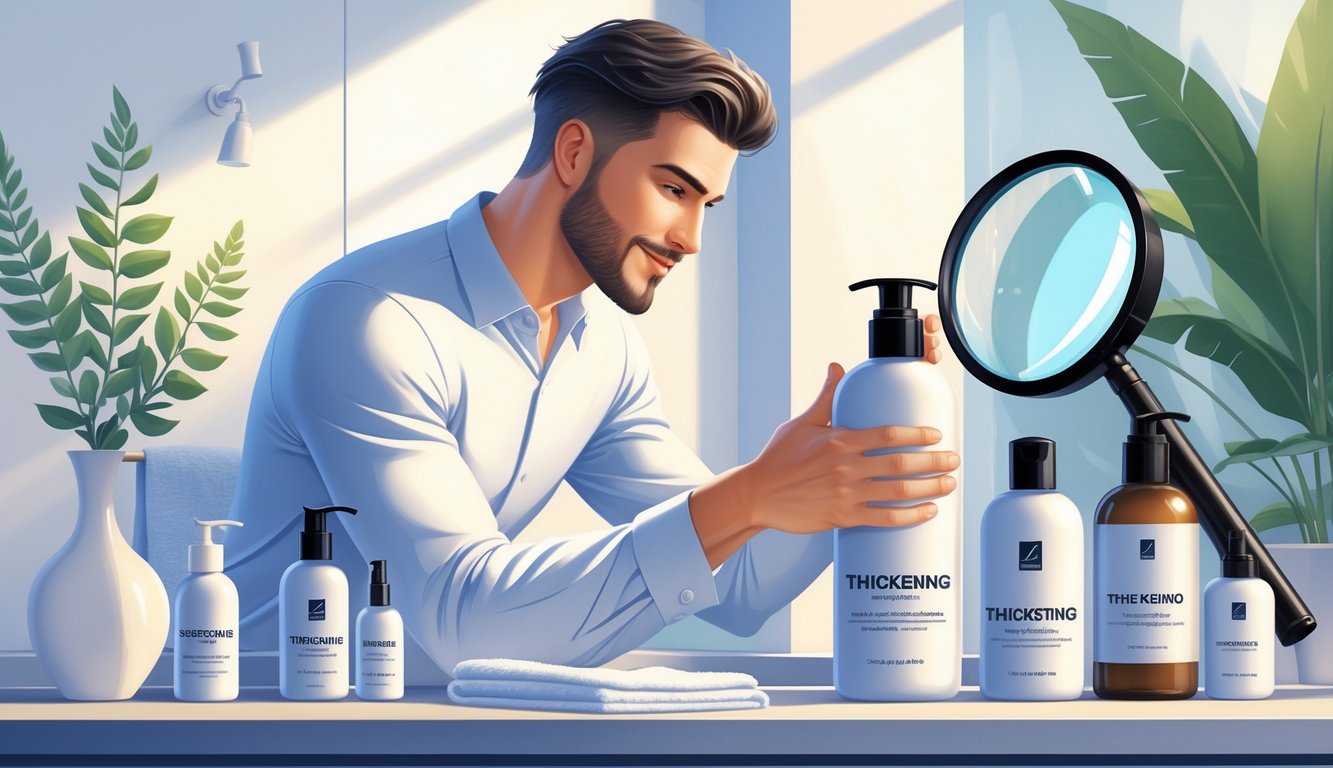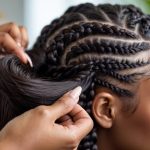
Building an Effective Hair Care Routine
Weirdest thing? Guys obsess over thickening shampoo, then just use it like body wash and wonder why nothing changes. My own routine? Messy. Got better when I realized not all shampoo is just soap in a different bottle.
Frequency and Application for Maximum Effect
Dr. Murphy-Rose told me twice a week, but I did every other day and my scalp freaked out. Asked another derm (awkward), she just said, “Patience. Less is more, scalp health isn’t a contest.” Nobody tells you massaging the shampoo in for a full minute (even when you’re half asleep) matters more than how often you use it. Quick lather-and-rinse? Pointless. Dr. Neil Sadick said most guys over-wash; I used to think 2-in-1 was genius. Patch test new stuff if your scalp goes nuts—learned that the hard way after three days of forehead itch.
Not a single doctor could agree on hot or cold water for rinsing. Dr. Camp says lukewarm is best, but I never get it right anyway.
Combining With Conditioners and Treatments
I used to slap leave-in conditioner right on my scalp—my stylist friend nearly died laughing. Don’t do that unless you want limp, sad hair. Conditioner goes mid-length down, not roots. Now I wash, towel-dry, and use a light, non-greasy conditioner—no more weighed-down hair, flakes gone.
Derms push caffeine or minoxidil serums (Rogaine, Dr. Camp loves it) alongside shampoo because shampoo alone won’t do much for growth. Leaving treatments on forever? Doesn’t help, just leads to buildup and breakouts. Hydration matters. Dry hair snaps, hydrated hair bends—something I ignored until I went sulfate-free.
2-in-1s? Fine for travel, but every derm I asked called them “emergency only.” They smell nice, that’s about it.
Adapting to Seasonal and Lifestyle Changes
Every December I panic about hair routine—office air is dry, static everywhere, and if you don’t switch it up, you look like you rubbed your head on a balloon. I change my routine every fall, go richer for winter, lighten up for summer. Most people don’t, and it shows.
Dr. Brendan Camp pointed out gym sweat and city air wreck your scalp (“Underrated,” he said, barely looking up). Skip a post-workout rinse? Flakes for days. Hotel water screws up my hair, so now I travel with my own shampoo and conditioner—those gym bottle freebies are a disaster.
Sun, wind, chlorine—your hair gets hammered all year. I use UV-protecting leave-in sprays now (didn’t even know those existed until last year). Not dramatic, but every derm I’ve met brings up weather adjustments. Apparently, even the experts know weather will destroy your “perfect” routine.
Supporting Hair Health Beyond Shampoo
Let’s be honest—shampoo is like 10% of the battle. If I’m eating garbage and skipping supplements, nothing works. Miss the big picture and you’ll just get frustrated, blaming the bottle for what’s really a diet or stress thing. Shedding? Always more going on.
Diet, Supplements, and Hair Growth
Nobody tells you protein isn’t optional. Hair is mostly amino acids, and my derm said if you’re under 50g a day, your follicles are starving. Vitamins E, C, zinc—they’re quietly patching up oxidative damage while you’re obsessing over shampoo. Multivitamins? Meh. I see guys sabotaging growth with crash diets or skipping vegetables.
Turmeric gets hyped way too much, but there’s actual research—it helps with inflammation, which slows regrowth. Collagen peptides in my coffee? Didn’t do much, but a 2023 Dermatology Times review says consistent micronutrients plus biotin or saw palmetto can make a difference. Nutrafol’s ingredients read like a smoothie, not a prescription, but derms keep recommending it anyway.
I tried tracking fiber and antioxidants—berries and spinach at breakfast did more for my scalp than any thickening shampoo. If you don’t see slow progress in six months, get labs—thyroid and iron sneakily cause hair loss, and nobody warns you.
Stress Management and Hair Loss
People love to say, “Just meditate,” while I’m staring at a brush full of hair. Telogen effluvium (the fancy term) shows up months after stress hits—lost my job, doomscrolled the news, and my hair started falling out. It sounds minor, but I read a study (AAD, 2022) saying chronic stress bumps shedding up by 30%.
I forced myself to do ten minutes of deep breathing a day. Maybe it’s all in my head, but cortisol really does shove hair into “resting” mode. Tried a digital detox, but then I’d doomscroll anyway. Friends say exercise helps, but unless I stick to it, results are random.
Red light therapy? Sounds like a joke, but some derms actually prescribe it (low-level laser therapy, Google it). Meditation, walking the dog—results are all over the place, but when I spiral into anxiety, I always see more hair in the drain. Not just in my head—stress messes with immune stuff, even digestion, so nutrition gets weird too.
Medications and Topical Solutions
Minoxidil—yeah, Rogaine, or whatever store-brand foam’s on sale—has been my go-to since every dermatologist I’ve pestered just shrugs and says, “Sure, use it.” Dr. Brendan Camp in New York flat-out told me it drags out the hair’s growing phase, basically stalling the inevitable. You can grab it anywhere, but let’s be real: most people quit way too soon, then act surprised when they’re not magically sprouting a mane after three weeks. It says six months right there. Also, that initial shed? Terrifying. Nobody warns you.
Finasteride is a whole other can of worms. Messes with hormones. Sometimes messes with your mood. Nobody likes talking about the side effects, but they’re there. I’m not touching it unless a real doctor tells me to. Clinics love to hype caffeine or rosemary oil, but honestly, nothing else has the mountain of studies minoxidil has. Don’t let an Instagram ad convince you otherwise.
Lately, I keep seeing “topical antioxidants” at derm conferences—custom serums, all that jazz. Are they proven? Not really. Maybe they look good in a spreadsheet, but I don’t see them in regular people’s routines unless you’re paying out the nose. When my scalp gets angry—red, itchy, that whole mess—I just reach for zinc shampoo or, if I’m desperate, a corticosteroid drop. Nobody wants to admit they need a prescription, but sometimes that’s the only thing that works. Funny how the real fix is never just another shampoo.
Caring for the Scalp: The Foundation of Thick Hair
You know what’s wild? Nobody tells you how much your scalp will rebel before your hair even starts thinning. Seriously, scalp health is not optional. Biotin gets all the hype, but one professor just waved it off and said, “It’s the microbiome, not the hair itself, that matters.” Not what I wanted to hear.
Scalp Care and Microbiome Balance
Here’s the chaos: those gritty “deep cleansers” and the endless cycle of dry shampoo? They nuke your scalp’s microbiome. Didn’t believe it either, but then I stumbled on a 2023 AAD report—apparently, if your scalp’s flora is off, you’re 40% more likely to see extra shedding in humid months. I noticed it too. Whenever I doubled up on shampoo, my scalp freaked out—flakes, soreness, the works.
Some thickening shampoos brag about tea tree oil or pomegranate enzymes. Fine, those enzyme exfoliants can help, but overdo it and you’ll just dry yourself out. I stick to basics: low-sulfate stuff (OGX Biotin & Collagen, for example), and sometimes a probiotic scalp serum—some trichologist claimed it “keeps the yeast in check.” Maybe it does, maybe it’s placebo, but my head feels better.
| Bad Habit | Better Alternative |
|---|---|
| Daily clarifying shampoos | 1-2x/week gentle, scalp-focused wash |
| Ignoring irritation | Address early with soothing serums |
| Hot water rinses | Lukewarm or cool rinses |



